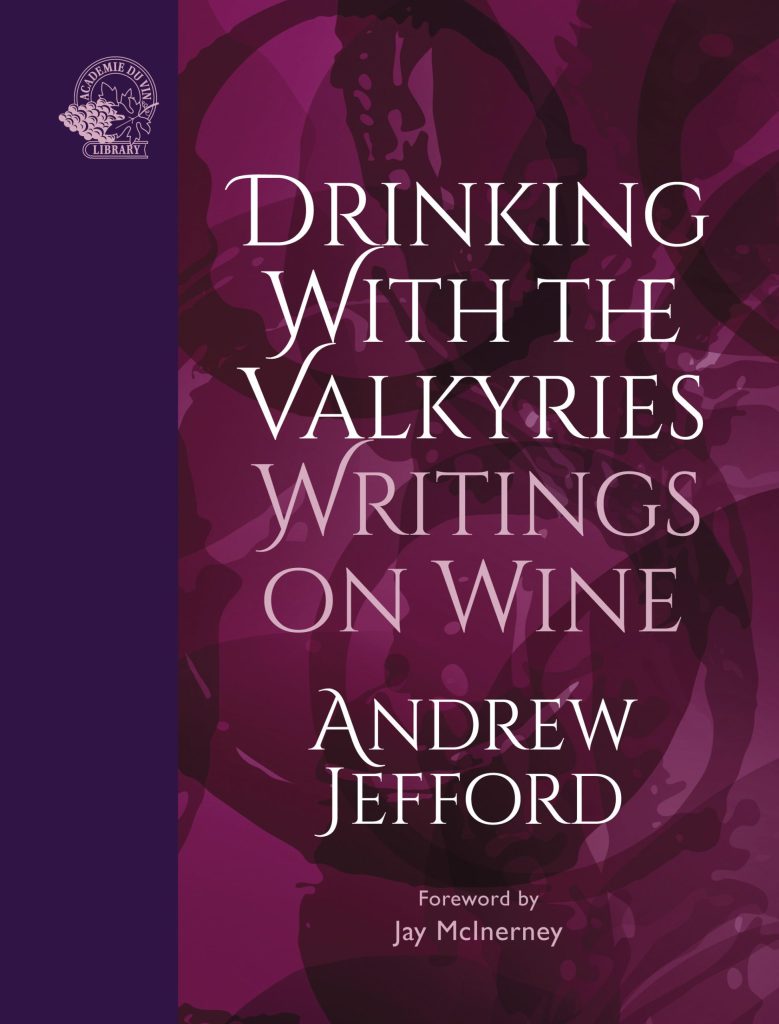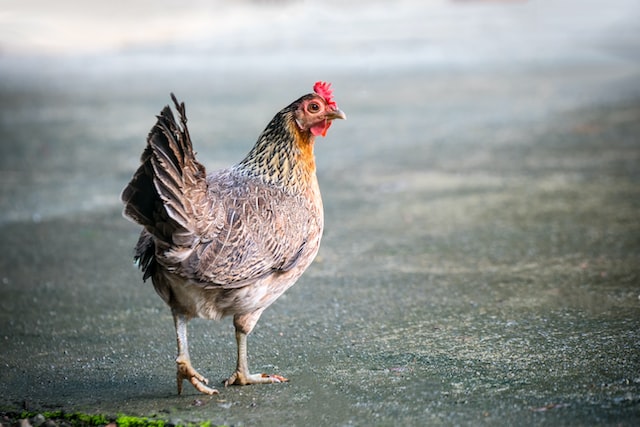Andrew Jefford is one of the most celebrated wine writers in the world, known for his lyrical prose which delve into the philosophy of wine. Drinking with the Valkyries: Writings on Wine is his new book, a collection of his essays, published by Academie du Vin Library. In this extract from the book, Jefford ponders on the ‘transactional flaw’ of wine.
Gallus gallus domesticus is the commonest bird in the world. You may have a dead one in your fridge right now, along with half a dozen of its unfertilized eggs. You may even have a few live ones, contentedly imprisoned in your yard.
And then one day, leafing through a book of poems, you happen to read that
The Hen
Worships the dust. She finds God everywhere.
Everywhere she finds his jewels.
and things change. The commonest bird in the world becomes radiant. You know her better. Perhaps you know her for the first time.
I don’t want to labour the point. We all have our favourite poems, or paintings, or pieces of music: works of art that drench us in electricity, help us see anew, see aright, see further, feel more deeply, melt in empathy. This experience is common, sublime and necessary; part, most of us feel, of being fully human. A life shorn of these experiences (though many such must be lived) makes a daunting prospect.
Enjoying great wine is like this. Suddenly there are scents and flavours in a glass that writhe us upwards: provoking, beautiful, haunting. We want to tear into them, not just to savour but to understand. We wire ourselves mentally to the place they came from, and find ourselves in love with that place as much as with the wine, since this beauty can only have come from that place. Further explorations beckon. Soon we have mental mycelia in place, threading the humus of this culture; they set us working and set to work in us; we digest our earth through wine. Our relationship with the planet grows deeper and fonder through this emplaced inebriation.
We are creator-curious, too: what were the gestures that brought this beautiful thing into being? These are a matter of craft, not art. Ted Hughes (the quotations in this text come from his poem ‘The Hen’) began with a sheet of blank paper; he was the poem’s entire maker; that is art. The viticulturist and winemaker, by contrast, solicit and later fashion a gift of nature; they are co-makers, co-workers with skies, with hillsides, with yeasts. The artistry and the brilliance is mostly nature’s, though it would not exist at all without the gate-keeping craftswoman or craftsman.
Note, though, that we appreciate the great poem and the fine wine in a similar way: part-analysis, part-awe. Both reward our intense attention. It is this experience that lies at the heart of whatever you want to call the common passion wine lovers share. This is the joy of wine; this is what unlocks its world of difference. It is here that you find its richness and sustenance and nourishment. Such nourishment isn’t quite identical to that surrendered by a work of art, since the ingestion of ethanol is involved, but there is kinship: it is at the very least a disreputable cousin. Ethanol alone is not responsible. White Claw Hard Seltzer will not take you on a similar journey.
She rakes, with noble, tireless foot,
The treasury of the dirt.
There are, though, two classes of artistic experience, two ways of nourishing ourselves on works of art: the disinterested and the transactional. For most of us, great art is free, or almost. You can spend an hour in front of Vermeer’s ‘Lady Standing at a Virginal’ or Caravaggio’s ‘Supper at Emmaus’ in London’s National Gallery for nothing. Streaming services make great music near-costless; a second-hand copy of War and Peace can be had for 99p. The works of William Shakespeare are downloadable in a few online minutes. The Hughes estate still enjoys copyright on his Collected Poems, but the book costs £16.99 and this poem occupies one page out of 1333, so its price is 1.27 pence, and it will illuminate the rest of my days. Costless enjoyment of great art, by the way, is one of the enormous privileges of contemporary human life; this was rarely true in times past. (Save when stumbling into cathedrals.)
If you want to own ‘originals’, of course, the case is different. Were an authentic Caravaggio or Vermeer to come to auction, and should you have the perfect spot for it in your living room, you would need well over £100 million. A complete copy of Shakespeare’s First Folio was sold for $9.98 million in New York in October 2020. First editions and signed copies of books and records find a ready collectors’ market; there’s kudos to having heard the greatest musicians perform, regardless of ticket price; those denied the experience will always be assured that the live version was superior to the recording (even when recordings of the live performance fail to back the assertion). Private ownership of a great painting, furthermore, snuffs out its wonder for the world as the gavel falls. The canvas in question may slide into a bank-vault maw, to be seen by no one aside from bored security guards and anguished conservators until, several decades later, its profit as an ‘alternative asset’ is realized and its owner financially nourished.
Wine, in a sense, is worse: it is condemned to be transactional. This is wine’s curse. You cannot go to the National Gallery and spend an hour enjoying a glass of La Tâche for free. Spotify will not stream it into your kitchen. There is no second-hand paperback version of La Tâche. No one enjoys La Tâche disinterestedly; everyone has skin in the game. The owner plays potentate; the guests are flattering courtiers; every sip is a sacrament at the high mass of wealth and privilege.
The moment that significant pecuniary value attaches to an aesthetic experience, it begins to tarnish. Infections set in: elitism, snobbery, fashion, the clique, avarice, exclusion. Of course La Tâche is an extreme case, but the difference with a £20 Gigondas is one of degree, not kind; the problem is that there is a price tag at all, since some noble bright enquiring spirit is always excluded. Innocent aesthetic enchantment belongs only to those for whom the price does not matter.
With her eye on reward
She tilts her head religiously
At the most practical angle
Which reveals to her
That the fox is a country superstition,
That her eggs have made man her slave
And that the heavens, for all their threatening,
Have not yet fallen
There are many sad ramifications for wine, which should bring joy and happiness. Chief among these is that its discourse is drenched in considerations of cost and value, of distribution, of sourcing and of transaction. Much wine writing is consequently doomed, both by those commissioning and consuming it, to be shopping list after shopping list, bottle shot after bottle shot, suggested purchase after suggested purchase, hurried along the transactional mill race with a froth of superlatives. The dullest thing about any wine is its price tag, yet price is always there, torturing the wine and poisoning its aesthetic nourishment. The better and more aesthetically interesting the wine, the more exclusive the drinking circle – and the stronger the poison. Critics and writers rarely pass comment on this, writing as if La Tâche could indeed be streamed into your kitchen by Spotify, yet it makes those of us who write about fine wines the high priests and priestesses of exclusion.
Can wine’s transactional flaw be subverted? It can’t. We’re discussing a fastidiously crafted object from a unique patch of earth and a single seasonal cycle, not a reproducible work of art. Of course it must be transactional; it would be idiotic to argue otherwise.
Rather than a flaw, then, this is really a kind of tragic destiny. Wine is, almost alone among comestible products, one whose appreciation is destined to have something in common with the appreciation of works of art. It is that which makes its colossal inequalities seem unjust.
Drinkers can respond. We can decide to spurn wine hierarchies, and refuse to exchange £50 or £80 for a wine when one at £18 would provide just as much aesthetic nourishment: my own drinking life has been one long amble through the foothills, yet the thrill of discovery has only grown with time. There has never, in human history, been a time of greater wine endeavour, not all of it misguided. We can mock the pretensions of luxury, and refuse to participate in the silliness of its discourse. We can remain jocund, never taking wine too seriously; murmur ‘it’s only wine’ to yourself from time to time. Aesthetic experiences may indeed be essential to a life richly lived, but in times of crisis or struggle, they’re insignificant. We can be open to the anarchic, and to alternative aesthetic languages. Forget obsessions with sulphur and fantasies of purity: this is the real contribution of the natural-wine movement to wine’s pool. We might even try asking the rich to share a little more. There are signs that the wine world is almost ready to face its abysmal record on inclusivity; part of the solution surely means addressing the transactional flaw. Perhaps there is a future for something called wine philanthropy.
We should never forget, too, the keystone of wine aesthetics: difference precedes excellence. It’s a liberation of sorts.
She is a hard bronze of uprightness.
And indulges herself in nothing
Except to swoon a little, a delicious slight swoon,
One eye closed, just before sleep,
Conjuring the odour of tarragon.
 Drinking with the Valkyries: Writings on Wine is available online at Academie du Vin Library.
Drinking with the Valkyries: Writings on Wine is available online at Academie du Vin Library.
Visit Member Benefits to access a discount code to the Academie’s books.

